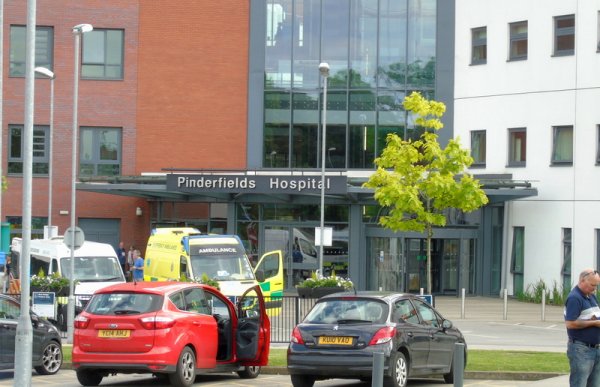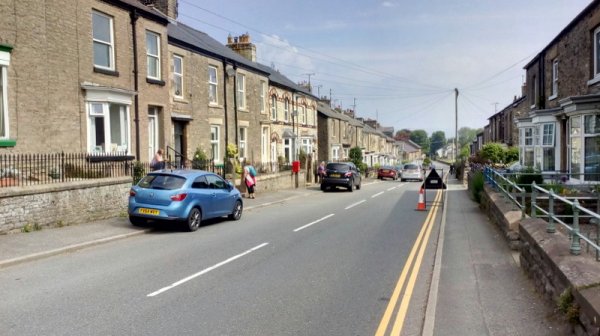Sep 13th 2023, 15:53
Blog - 13th September 2023
In this blog I consider what organisations need to do to register with the Care Quality Commission; good practice in the provision of street and footway lighting; and webinars on service charges and local authority housing.
Last week I posted a new briefing paper about ‘Registration with the Care Quality Commission’.
The Care Quality Commission is the independent regulator of health and social care services in England. This includes care homes, hospitals, dental services, clinics, services in the home, general practitioners, mental health services and services in the community. It is an executive non-departmental public body of the Department of Health and Social Care of the United Kingdom. It was established in 2009 under the Health & Social Care Act 2008.

Pinderfields Hospital in Wakefield.
The Care Quality Commission's stated role is to make sure that care services in England provide people with safe, effective and high-quality care, and to encourage those providers to improve. It carries out this role through checks during the registration process which all new care services must complete, as well as through inspections and monitoring of a range of data sources that can indicate problems with services. The commission's remit also includes protecting the interests of people whose rights have been restricted under the Mental Health Act.
The Care Quality Commission regulates providers of ‘health or social care in, or in relation to, England’, where:
Any person (individual, partnership or organisation) who provides regulated activity in England must be registered with the Care Quality Commission otherwise they commit an offence. The purpose of this briefing paper is to outline the process for registering with the Care Quality Commission as a provider of care.
To view or download your copy, please click here.
Regular readers of this blog will know that, in May 2023, I was elected to Kirkby Stephen Town Council. At our meeting last week we received an excellent presentation from Councillor Peter Thornton, the portfolio holder for Highways at Westmorland & Furness Council; and I took the opportunity to tackle him about Kirkby Stephen’s rather aged and dysfunctional street and footway lighting!
My point was that the creation of the new Westmorland & Furness Council, an increasing awareness of the environmental impact of street and footway lights and technological developments may give us an opportunity to move on from the current cycle of complaint and confrontation to a new approach to street and footway lights that will illuminate dark streets in a way that protects the environment.

South Road in Kirkby Stephen, where many residents complain about the street and footway lights
The All-Party Parliamentary Group for Dark Skies has produced a policy plan that refers to street lighting and that has been well received even though the government has yet to accept its recommendations. The UK professional lighting bodies, the Institute for Lighting Professionals (ILP) and the Society for Light & Lighting (SLL) are updating their guidance to help reduce light pollution across all forms of lighting. For example, the ILP and the Bat Conservation Trust have produced a guidance note on ‘Bats and Artificial Lighting at Night’. This concludes that it is important to devise street lighting systems that are sympathetic to the needs of bat populations.Cumbria County Council (the predecessor of Westmorland & Furness Council, of which Councillor Thornton was Deputy Leader) has already introduced several new lighting schemes. It has invested £12.9million to replace over 45,000 street lights with more efficient and cost effective LED technology. The programme enabled the Council to reduce its annual lighting energy bill by over £1million, reducing annual energy consumption by 60% and saving more than 9,000 tonnes of carbon emissions each year.
The new LED lanterns are manufactured by Thorn Lighting and use their innovative ‘Night Tune’ LED technology. The lanterns emit a blend of white and amber light that can be automatically adjusted to suit the time of night and level of traffic on the road. Visibility for drivers and pedestrians is not affected by the blended light colour and the scheme is fully compliant with the required safety standards for street lighting.
New ‘dark skies’ and wildlife-friendly lighting was installed along the Cliff Terrace pathway in Fellside, Kendal, in June 2021 as a result of a partnership between the Council’s lighting team, thorn lighting UK and local residents. Cliff Terrace happens to be in Councillor Thornton’s ward. The new lights are an attractive design and are mounted on restored cast iron lamp posts. New heritage LED lights direct the light beam downwards giving much better and safer visibility. They have also reduced electricity use by around 50% and the warmer colour of the light better protects wildlife and reduces glare onthe humaneye.
Other towns and villages that have benefitted from new lighting include Alston, Ambleside, parts of Carlisle, Dent, Glenridding, Lorton, Sedbergh and Warcop.
The ‘Friends of the Lake District’ consider that lighting that safeguards ‘dark skies’ helps to protect biodiversity, reduce energy wastage and carbon emission, enhances health and well-being and conserves the character of landscapes and townscapes. I have spoken with Jack Ellerby of the ‘Friends of the Lake District’ who has been involved in several of these schemes. His conclusion on the work so far is that:
“80% carbon emissions have already been saved by Cumbria County Council in all the changes they have made so far. We have worked with them in different parts of the county to change the angle, intensity and colour temperature of the lights. In Kendal, we’ve installed heritage-designed lights that look like the old Victorian gas lamps in the conservation area. These heritage lights produce less glare into the sky and the adjacent house windows and focus the light beam onto the path where it’s needed.”
Jack Ellerby has suggested that an ‘inventory of the lights’ should be carried out in Kirkby Stephen on a dark evening that would result in the development of a plan for an improved street lighting system in the town. He has offered to assist with this. As some of the street and footway lights in Kirkby Stephen are owned by the Town Council and others are owned by Westmorland & Furness Council, I suggested that this be done jointly by the two councils.
Councillor Thornton’s answer was that he couldn’t agree to anything because he didn’t have a policy on street and footway lights. I look forward to him getting a policy so that we can start a discussion about improving lighting, conserving wildlife and saving money.
I May I posted a paper about street and footway lights. To view or download your copy, please click here.
My next webinars will be as follows. For further information or to register, please click on the links below: